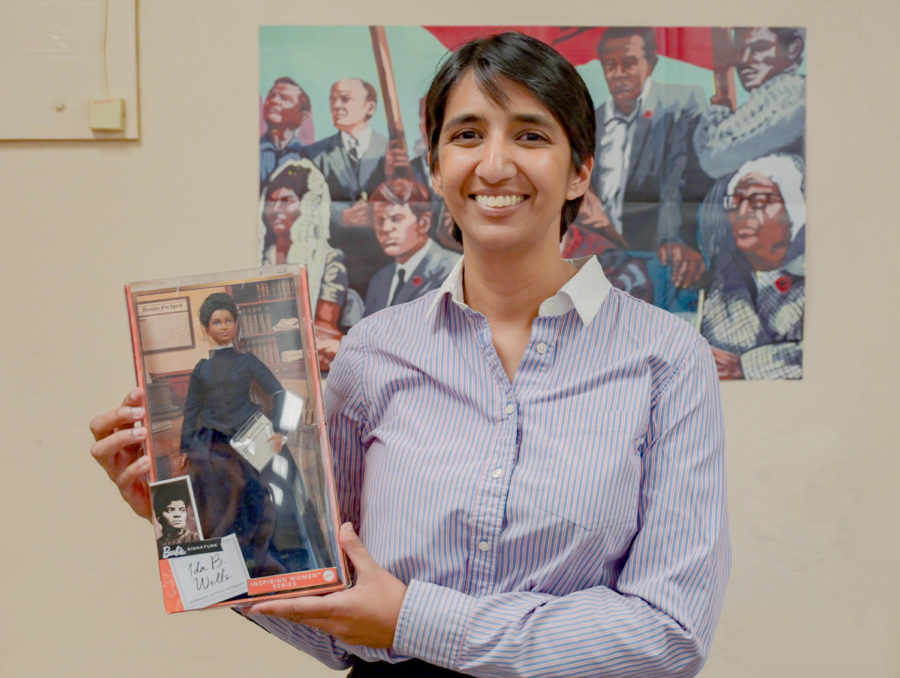The abridged version of this article appeared in the June. 2023 print edition of The Mirror. This is an uncut version.
This new course has left a diverse group of politicians, parents, students, and academic leaders at odds regarding the course’s content and relevance.
The course faced especially harsh backlash in Florida, where Republican Governor Ron DeSantis and the state’s education department labeled its teachings as “indoctrination.” They announced intentions to ban the course from Florida high schools unless the curriculum was revised. The National Parents Union was outraged by the decision to block the course.
Shortly after Florida’s threatened ban, the College Board released the official curriculum for the new course, which had been revised. Governor DeSantis maintained that his “principled stand for education over identity politics” prompted this nationwide revision. The revised curriculum addresses many of Florida’s concerns, either by omitting certain topics or categorizing them as optional project subjects.
The upcoming 2023-2024 academic year will see Van Nuys High School offering AP African American Studies for the first time. Despite the controversy, the course’s introduction follows its successful pilot year, which was rolled out in approximately 60-70 schools across the country. Social science teacher, Ms. Aditi Mehta Doshi, will be teaching the course here.
“I am very grateful that the school is offering this opportunity,” said Ms. Doshi. “I feel a sense of responsibility to do this course justice and to ensure students are exposed to the discipline of African American studies.”
The curriculum for African American Studies stands out from other AP history classes as it focuses on a broad spectrum of knowledge. According to Ms. Doshi, it’s the interdisciplinary nature of the course that makes it exciting.
“It is going to combine elements of history, literature, art, music, data analysis and we are going to study the African American experience with all these types of sources,” she said.
Ms. Doshi is confident about the availability of resources to support students’ learning about the various aspects of African American history and culture. She emphasizes that both instructors and students will need to work diligently to develop and organize these resources over time.
“It’s not that the expertise is not out there, it’s just that instructors and students in this class will have to work hard to develop them over time and organize them,” Ms. Doshi said.
The main objective of the course is to delve deeper into African American history than what is typically covered in American History courses. Ms. Doshi explains that the course aims to explore the complex stories that encompass the full spectrum of the African American experience in America.
“The class is going to allow us to study the complex narratives that get the full humanity of the black experience in America,” Ms. Doshi said. “African American Studies has its own framework, themes and narratives that are not shared with the broader American narratives.”
During the course, students will explore different facets of black history and the African diaspora. They will also complete an independent research project on a topic of their choosing. According to Ms. Doshi, this will provide students with the opportunity to learn how to conduct college-level academic research and explore a topic that is meaningful to them in-depth.
“Students will have the opportunity to pick a topic out of the breadth of African American studies and learn how to do college level academic research and to explore a topic in depth that is meaningful to them,” Ms. Doshi said.
The course will culminate in the end-of-year AP exam, which will include the traditional multiple choice and writing portion as well as a three-week research project.
The launch of this new course has thus far been free of local controversy. However, the relevance and importance of the course has been a subject of debate since its inception. Governor DeSantis publicly criticized newer topics in the curriculum, such as the Black Lives Matter movement and black queer studies. He deemed these “problematic” and barred the class from Florida classrooms until they were removed, arguing that the course “lacked educational purpose”.
The College Board removed the disputed topics the following month after Governor DeSantis’s January statement. However, they denied that the governor’s remarks instigated their updated curriculum, providing evidence showing that the course’s revision process started in December 2022.
“College Board claimed that these topics were removed not because of political controversy, but because there wasn’t enough time in the schedule to teach the course,” History Department Chairman and social studies teacher Mr. Jacob Ferrin said.
Both Ms. Doshi and Mr. Ferrin agree that any debate against the validity of this course is outrageous and inarguable.
“The idea that this class quote on quote lacks educational purpose is frankly madness,” Mr. Ferrin said. “American history classes in the US have so historically underrepresented if not completely changed and bastardized the history of African American people in this country to such a great extent that if you try having conversations with normal people, they don’t know things.”
The marginalization of certain communities in the mainstream study of U.S. history has been a continuous issue. Ms. Doshi believes it is imperative that students and teachers strive for a complex understanding of different community experiences.
“We have a responsibility, as students, as teachers, to come to a complex understanding of different community experiences,” Ms. Doshi said. “Whether we’re talking about the African American community or the Latino community or the Asian community.”




Jamal • Jun 19, 2023 at 4:39 pm
what about chicano studies